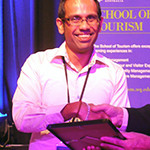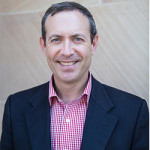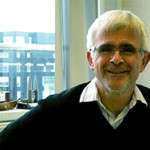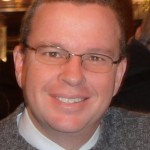Best Paper award testimonials
June 30, 2014
Several past Best Paper winners have shared their stories below.
2014
Girish Prayag, University of Canterbury, NZ
 I regularly attend the CAUTHE conference not only for the high quality of the papers presented but also the networking opportunities it offers. I find the mix of conceptual and empirical papers stimulating and through this conference I have met some of my current co-authors. CAUTHE is probably one of the best conferences in the Australasia region. The diversity of delegates and special interest tourism topics represented make the conference stand out. The conference also offers PhD candidates a fantastic opportunity to get constructive feedback on their work and the mentoring program is nurturing future leaders in tourism in the Australasia region. Last but not least, the big debate is always my favourite part of the conference. I like the humorous approach on serious issues facing the tourism industry. Being awarded best paper last year was an honour and a recognition by peers of the quality of academic work that is produced in this part of the world. (April 2014 newsletter)
I regularly attend the CAUTHE conference not only for the high quality of the papers presented but also the networking opportunities it offers. I find the mix of conceptual and empirical papers stimulating and through this conference I have met some of my current co-authors. CAUTHE is probably one of the best conferences in the Australasia region. The diversity of delegates and special interest tourism topics represented make the conference stand out. The conference also offers PhD candidates a fantastic opportunity to get constructive feedback on their work and the mentoring program is nurturing future leaders in tourism in the Australasia region. Last but not least, the big debate is always my favourite part of the conference. I like the humorous approach on serious issues facing the tourism industry. Being awarded best paper last year was an honour and a recognition by peers of the quality of academic work that is produced in this part of the world. (April 2014 newsletter)
2007
Associate Professor David Solnet, University of Queensland
 When David Solnet won the 2007 CAUTHE Award for Best Full Paper for Employee-customer linkages: a social identification perspective in a hotel industry context he had only just completed his PhD. He was employed by the University of Queensland’s School of Tourism as a lecturer and Director of Industry Partnerships. He had come from senior management roles in the food service/restaurant sector, and was undecided about his post-PhD career and whether to stay in academia or to build a consulting career. He said winning the award “helped a lot with credibility – with myself (believing that I actually could belong in the academic community) and with my peers (many of whom saw me as passing through on my way to another career)”. Around the same time David also won Best Paper at iCHRIE and “the two awards gave me credibility and confidence to continue my academic career”. David has stayed at UQ and is now the leader of the Hospitality Team within the School of Tourism. He also serves as the School’s Adjunct Professorial Coordinator. He has leveraged his industry background and research interests, such as co-leading the Workforce Research Team (with Dr Richard Robinson). His consulting work ranges from work with federal and state government and agencies on tourism workforce development to serving on a number of management advisory boards for multi-unit restaurant groups as well as management and senior executive mentoring. (March 2013 newsletter)
When David Solnet won the 2007 CAUTHE Award for Best Full Paper for Employee-customer linkages: a social identification perspective in a hotel industry context he had only just completed his PhD. He was employed by the University of Queensland’s School of Tourism as a lecturer and Director of Industry Partnerships. He had come from senior management roles in the food service/restaurant sector, and was undecided about his post-PhD career and whether to stay in academia or to build a consulting career. He said winning the award “helped a lot with credibility – with myself (believing that I actually could belong in the academic community) and with my peers (many of whom saw me as passing through on my way to another career)”. Around the same time David also won Best Paper at iCHRIE and “the two awards gave me credibility and confidence to continue my academic career”. David has stayed at UQ and is now the leader of the Hospitality Team within the School of Tourism. He also serves as the School’s Adjunct Professorial Coordinator. He has leveraged his industry background and research interests, such as co-leading the Workforce Research Team (with Dr Richard Robinson). His consulting work ranges from work with federal and state government and agencies on tourism workforce development to serving on a number of management advisory boards for multi-unit restaurant groups as well as management and senior executive mentoring. (March 2013 newsletter)
2006
Professor Tom Baum,University of Strathclyde, UK
 In 2006 Tom Baum was attending his first CAUTHE in almost 10 years. Brian King asked him to sit near the front of the opening session: “I, innocently, thought that this was to help fill the forward seats!” Instead, Tom was called to the stage to receive the Best Paper Award for “Reflections on the nature of skills in the experience economy: challenging traditional skills models in hospitality”. At that time Tom had just completed 6 years as Head of School in the Department of Hospitality and Tourism Management at Strathclyde University. He commented “the world has changed dramatically since then”, and Tom is now part of University’s HRM department: “I’m teaching in the area, researching (as before) HR and workforce issues in the context of our industry and having responsibility for an exciting Masters in International HRM which we are offering in Glasgow and, from September, in Singapore”. He works with a wide variety of international agencies including the ILO, the World Bank, and the EU. Speaking of winning the CAUTHE award, Tom said “it acted as a platform from which much of my research collaboration with colleagues and universities in Australia and New Zealand was launched. It led me into adjacent areas to those where I have traditionally worked, such as volunteering and events, and has provided real insights into the pleasures and challenges of long-distance collaborative research.” (March 2013 newsletter)
In 2006 Tom Baum was attending his first CAUTHE in almost 10 years. Brian King asked him to sit near the front of the opening session: “I, innocently, thought that this was to help fill the forward seats!” Instead, Tom was called to the stage to receive the Best Paper Award for “Reflections on the nature of skills in the experience economy: challenging traditional skills models in hospitality”. At that time Tom had just completed 6 years as Head of School in the Department of Hospitality and Tourism Management at Strathclyde University. He commented “the world has changed dramatically since then”, and Tom is now part of University’s HRM department: “I’m teaching in the area, researching (as before) HR and workforce issues in the context of our industry and having responsibility for an exciting Masters in International HRM which we are offering in Glasgow and, from September, in Singapore”. He works with a wide variety of international agencies including the ILO, the World Bank, and the EU. Speaking of winning the CAUTHE award, Tom said “it acted as a platform from which much of my research collaboration with colleagues and universities in Australia and New Zealand was launched. It led me into adjacent areas to those where I have traditionally worked, such as volunteering and events, and has provided real insights into the pleasures and challenges of long-distance collaborative research.” (March 2013 newsletter)
2005
Professors Larry Dwyer and Brian King
In 2005 Larry, Brian and Bruce Prideaux were awarded the Best paper award for their paper entitled ‘Effect of unethical business practices on Australian Inbound Package Tourism’.
Larry Dwyer At the time of the award, Larry was the Qantas Professor of Travel and Tourism Economics at UNSW and was also undertaking a substantial amount of research for the Sustainable Tourism CRC. In Larry’s words “How times change! The CRC is no more, which lead to Qantas pulling the plug on funding the Chair.” Larry states that these days he is now a mere “humble Professor”. However, Larry did cheekily add that he had noted how Qantas profits had nose-dived since the Qantas Chair was abolished. Larry’s current title is: Research Professor, School of Marketing, Australian School of Business, UNSW. Reflecting on winning the award, Larry signalled, tongue in cheek, that it must have been the CAUTHE best paper award that was the instigator of his appointment to being the President of the International Academy for the Study of Tourism, President of the International Association for Tourism Economics, and a Foundation Fellow of CAUTHE since all those successes occurred after receiving the award. I finally managed to get a serious moment from Larry though when he said that he believes that “CAUTHE is an outstanding example of an organisation that delivers substantial benefits to its members, both professionally and personally. It is a world leader among academic organisations in any field.”
Brian King When Brian won the award he was Professor and Head of the School of Hospitality, Tourism & Marketing at Victoria University. Since that time he has held a number of senior roles including at Pro Vice-Chancellor (PVC) levels. He recently returned to pursue tasks that fall under the technical term of “real stuff”. This technical term describes the tasks of teaching, research and engaging with tourism practitioners. From October 2012 Brian will become one of Australia’s great exports after being one of our great imports. He will take up the role of Professor of Tourism in the School of Hotel & Tourism Management at the Hong Kong Polytechnic University. Following the same post hoc fallacy we can see that the award was very important for Brian’s career, because he had not been a PVC prior to the award! Brian is a firm believer in recognition, as he believes it provides people with “reassurances” that they are “on the right track”. Brian calls himself a “serial CAUTHE attendee” and feels “privileged to be part of the diverse and vibrant CAUTHE community.” (September 2012 newsletter)
2004
Professor Dean Carson, Charles Darwin University
 Dean was awarded the best paper award for the paper, co-authored with Kim Adams, entitled Strategic knowledge management in tourism: Effectiveness and constraints. At the time Dean won the award he was at Southern Cross University. A year later he went to Charles Darwin University in the capacity of Research Fellow. He undertook some large collaborative projects and then in 2007 took on a broader role at CDU as Head of Population and Tourism Studies. This role involved looking at the future of tourism and also the future of residential population growth. In 2011 Dean took up a combined position at CDU heading their ‘Demography and Growth Planning’ research theme and as Professor of Rural and Remote Research at Flinders University. In addition, Dean holds three adjunct appointments: Wilfrid Laurier University in Canada, IMC University of Applied Sciences in Krems, Austria, and Umea University in Sweden. Dean feels that the CAUTHE award was a “pretty important part of my career”. He felt being recognised by peers was important and that it also helped him develop his approach to student supervision since the lead author on that award winning paper was an honours student at the time. It has enhanced his encouragement of honours students to publish as they go to whet their appetites for further academic pursuits. (September 2012 newsletter)
Dean was awarded the best paper award for the paper, co-authored with Kim Adams, entitled Strategic knowledge management in tourism: Effectiveness and constraints. At the time Dean won the award he was at Southern Cross University. A year later he went to Charles Darwin University in the capacity of Research Fellow. He undertook some large collaborative projects and then in 2007 took on a broader role at CDU as Head of Population and Tourism Studies. This role involved looking at the future of tourism and also the future of residential population growth. In 2011 Dean took up a combined position at CDU heading their ‘Demography and Growth Planning’ research theme and as Professor of Rural and Remote Research at Flinders University. In addition, Dean holds three adjunct appointments: Wilfrid Laurier University in Canada, IMC University of Applied Sciences in Krems, Austria, and Umea University in Sweden. Dean feels that the CAUTHE award was a “pretty important part of my career”. He felt being recognised by peers was important and that it also helped him develop his approach to student supervision since the lead author on that award winning paper was an honours student at the time. It has enhanced his encouragement of honours students to publish as they go to whet their appetites for further academic pursuits. (September 2012 newsletter)
